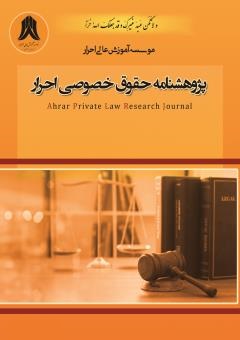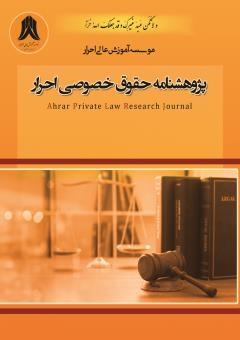Arbitrators' Competence in Maritime Arbitration: A Comparison of Specialized, Supervisory, and Enforcement Criteria in the UK LMAA and the Arbitration Center of the Iranian Chamber of Commerce
Subject Areas : Maritime lawseyed mahmood mehrinejad choobari 1 *
1 - Master of Private Law, Department of Law, Faculty of Literature and Humanities, Guilan University, Rasht, Iran.
Keywords: LMAA , Arbitration , Jurisdiction , IRAN , The UK ,
Abstract :
Maritime arbitration serves as a critical mechanism for resolving complex international commercial disputes, playing a pivotal role in the global shipping industry. This research employs a comparative-analytical approach to examine the qualifications of arbitrators in two maritime arbitration systems: the London Maritime Arbitrators Association (LMAA) and the Iran Chamber of Commerce Arbitration Center (ICAC). The study focuses on the differences in arbitrator competency criteria and the factors influencing the validity and enforceability of issued awards. Findings reveal that the LMAA prioritizes practical experience in the maritime industry, arbitrator independence, and cost transparency through its non-institutional (ad hoc) approach, while the ICAC emphasizes academic credentials, compliance with domestic laws, and adherence to Islamic legal principles. These differences directly impact international acceptance: 85% of LMAA awards are enforced outside the UK, compared to only 40% for ICAC awards. The ICAC’s centralized institutional structure, supervisory oversight, linguistic limitations, and non-accession to key international conventions (e.g., the Hamburg Rules 1978) pose enforcement challenges. In contrast, the LMAA’s procedural flexibility, alignment with global standards, and arbitrator specialization solidify its status as a leading model. The study recommends that the ICAC enhance its competitiveness by reforming civil procedure laws, establishing specialized maritime arbitration panels, and acceding to international protocols.
1. Savaraei, P and Ghaffari, M. (2023). Investigating the role of the British Maritime Arbitration Association in resolving disputes in the shipping industry. First International Conference on Law and Management, Educational Sciences, Psychology and Educational Planning Management.. [In Persian]
2. . Mirzazadeh, E, Zamani, S, Mohebbi, M , Rahimi, F. (2023). The Impact of Sanctions on International Commercial Arbitration. Legal Studies, 21(52), 33-64. doi: [In Persian]
3. London Maritime Arbitrators Association (LMAA) ,(2021). Guidelines for Aspiring Full Membership.
4. Honnold, J. (2009). Uniform Law for International Sales Under the 1980 United Nations Convention: Kluwer Law International.
5. Redfern, A & Hunter, M. (2015). Law and Practice of International Commercial Arbitration. Sweet & Maxwell..
6. Ambrose , K . maxwell, and M.Collet, london maritime arbitration. informa law from routledge , 2017
7. Khalid, N., & Suppiah, R. (2010). The Rotterdam Rules: Catalyst for trade or cumbersome convention? Maritime Policy & Management, 37(4), 447-450..
8. Litina, E. (2022). Maritime arbitration: Dilemmas, prospects, and challenges: Lessons from contracts for the carriage of goods by sea. Tulane Maritime Law Journal, 46, 513.
9. London Maritime Arbitrators Association [LMAA]. (2021). The LMAA Terms 2021. Retrieved from [https://lmaa.london.com].
10. London Maritime Arbitrators Association [LMAA]. (2021). Guidelines for Aspiring Full Membership. Retrieved from [ https://lmaa.london.com].
11. International Chamber of Commerce (ICC). (2022). Report on Enforcement of Arbitral Awards.
12. maa.london/the-rules-of-the-lmaa](https://lmaa.london/the-rules-of-the-lmaa)http://arbitration.ir

